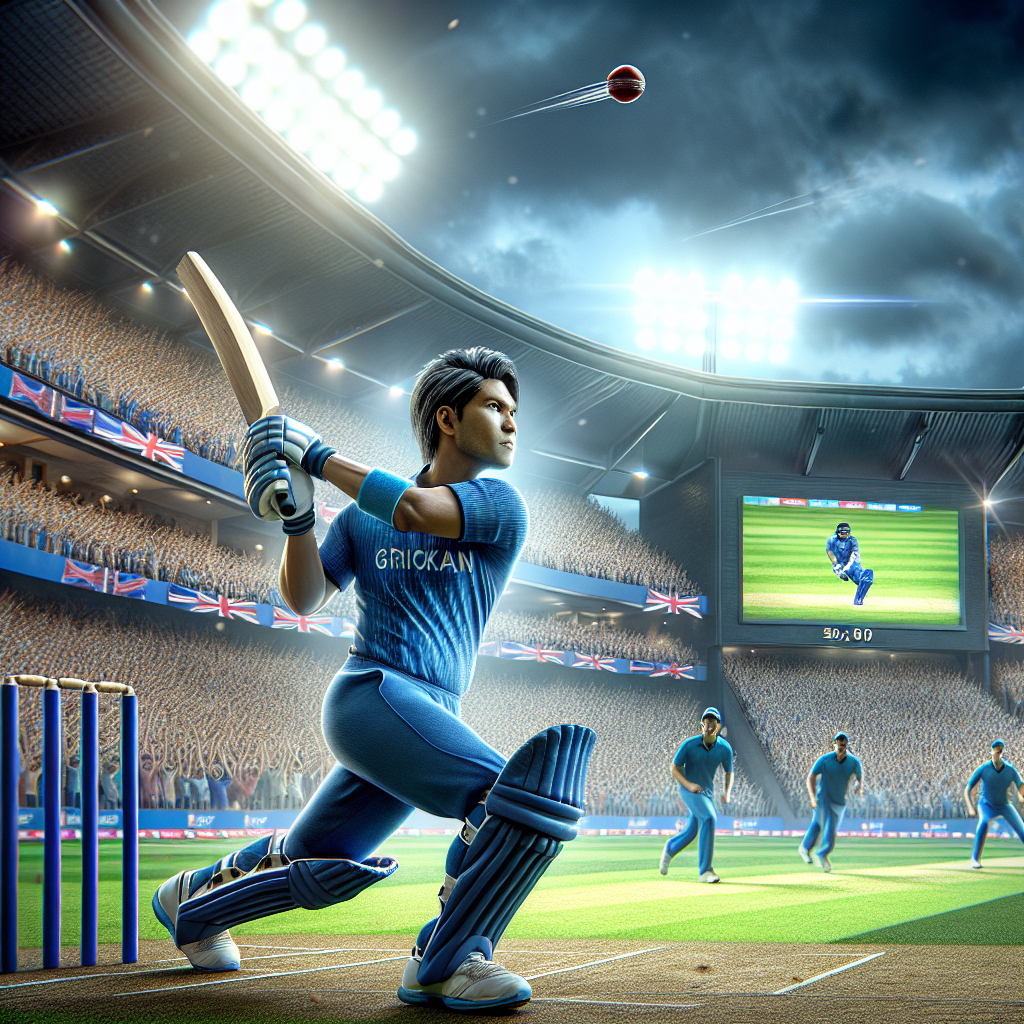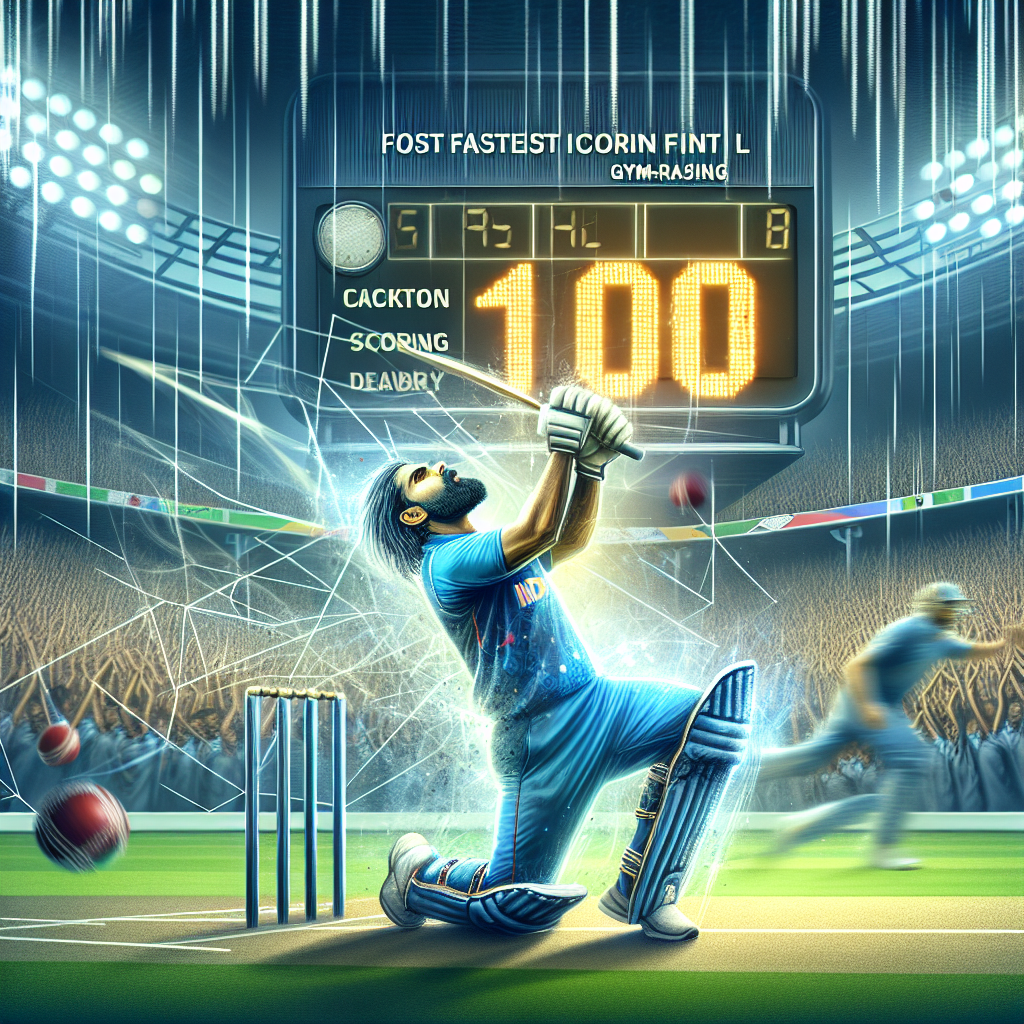Fastest world cup century


Cricket, often referred to as a gentleman's game, has witnessed numerous remarkable performances over the years. Among these, the record for the fastest century in a World Cup match stands out as a testament to a player's skill, power, and precision. This article delves into the history, significance, and impact of the fastest World Cup century, highlighting key players and moments that have etched their names in cricketing history.
The Significance of a World Cup Century
Scoring a century in a World Cup match is a significant achievement for any cricketer. The World Cup is the pinnacle of international cricket, where the best teams and players compete for the ultimate prize. A century in this context not only contributes to the team's success but also elevates the player's status in the cricketing world.
Fast centuries, in particular, are celebrated for their demonstration of aggressive batting and strategic acumen. They can shift the momentum of a game, demoralize the opposition, and energize the crowd. Achieving a century in record time requires a combination of skill, confidence, and the ability to read the game effectively.
Historical Context: Evolution of Fast Centuries
The concept of fast centuries has evolved over the years, with changes in playing conditions, equipment, and strategies. In the early days of cricket, centuries were often achieved through patient and calculated play. However, with the advent of limited-overs cricket and the introduction of powerplays, the approach to batting has transformed significantly.
Modern-day cricketers are equipped with advanced gear and have access to extensive data analytics, enabling them to optimize their performance. This evolution has paved the way for more aggressive batting styles, resulting in faster centuries.
Record-Breaking Performance: AB de Villiers' 2015 World Cup Century
One of the most iconic performances in World Cup history is AB de Villiers' century against the West Indies in the 2015 ICC Cricket World Cup. De Villiers, known for his innovative and explosive batting style, achieved his century in just 31 balls, setting a new record for the fastest World Cup century.
During this match, held at the Sydney Cricket Ground, de Villiers displayed an extraordinary range of shots, including powerful drives, deft sweeps, and audacious reverse hits. His innings included 8 fours and 10 sixes, showcasing his ability to dominate the bowling attack.
- AB de Villiers' century came off just 31 balls.
- He hit 8 fours and 10 sixes during his innings.
- The match was played against the West Indies at the Sydney Cricket Ground.
Impact of Fast Centuries on the Game
Fast centuries have a profound impact on the dynamics of a cricket match. They can alter the course of the game, putting immense pressure on the opposition and providing a psychological edge to the batting team. Here are some key impacts of fast centuries:
- Momentum Shift: A quick century can change the momentum of the game, giving the batting team a significant advantage.
- Psychological Pressure: The opposition bowlers and fielders may feel demoralized, leading to errors and lapses in concentration.
- Increased Run Rate: Fast centuries contribute to a higher run rate, setting challenging targets for the opposition.
- Fan Engagement: Spectacular performances captivate audiences, enhancing the entertainment value of the match.
Other Notable Fast Centuries in World Cup History
While AB de Villiers holds the record for the fastest World Cup century, several other players have also made their mark with rapid centuries. Here are a few notable mentions:
- Kevin O'Brien (Ireland): In the 2011 World Cup, O'Brien scored a century off 50 balls against England, leading Ireland to a historic victory.
- Glenn Maxwell (Australia): Maxwell scored a 51-ball century against Sri Lanka in the 2015 World Cup, showcasing his aggressive batting style.
- Brendon McCullum (New Zealand): Known for his explosive batting, McCullum scored a 52-ball century against Bangladesh in the 2015 World Cup.
Strategies Behind Fast Centuries
Scoring a fast century requires a strategic approach, combining aggression with calculated risk-taking. Here are some strategies employed by players to achieve fast centuries:
- Power Hitting: Players focus on hitting boundaries and maximizing scoring opportunities during powerplays.
- Shot Selection: Choosing the right shots based on field placements and bowler strengths is crucial for maintaining a high strike rate.
- Running Between Wickets: Quick singles and doubles can keep the scoreboard ticking and build pressure on the fielding side.
- Reading the Game: Understanding the game situation and adapting to changing conditions is essential for sustained aggression.
The Role of Technology and Analytics
In the modern era, technology and data analytics play a significant role in enhancing player performance. Teams and players have access to detailed data on opposition bowlers, field placements, and pitch conditions. This information allows players to devise strategies tailored to their strengths and the weaknesses of the opposition.
Video analysis tools enable players to study their own performances and identify areas for improvement. Additionally, wearable technology provides real-time feedback on physical metrics, helping players optimize their fitness and performance levels.
Conclusion: The Legacy of Fast World Cup Centuries
The record for the fastest World Cup century is more than just a statistic; it represents the pinnacle of aggressive and strategic batting. Players like AB de Villiers have set new benchmarks, inspiring future generations to push the boundaries of what is possible on the cricket field.
Fast centuries captivate audiences, energize teams, and leave a lasting impact on the game. As cricket continues to evolve, the pursuit of faster centuries will remain a thrilling aspect of the sport, showcasing the blend of skill, strategy, and innovation that defines modern cricket.
In summary, the fastest World Cup century is a celebration of cricketing excellence, reflecting the dynamic nature of the game and the relentless pursuit of greatness by its players.





